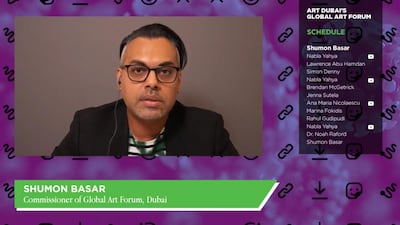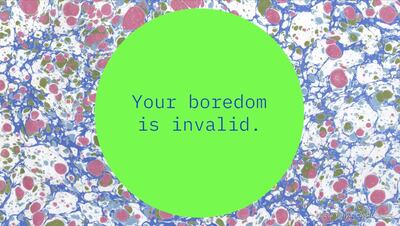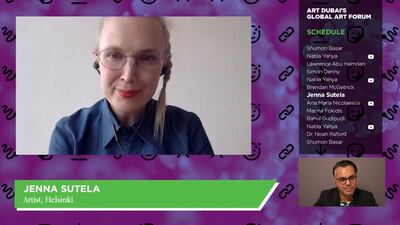“It’s clear that the future has been cancelled,” says author and curator Shumon Basar. “Or at least, indefinitely postponed.” He is speaking to the camera on Wednesday evening for a livestream of this year’s Global Art Forum, a cultural talks programme typically held during Art Dubai.
Meant to take place during the fair, the forum – like a section of Art Dubai's programme and many of the UAE's gallery exhibitions – has had to host its event online as the coronavirus pandemic fastens its grip around the world, halting international travel and large gatherings.
Themed Do You Story?, this year’s iteration intended to investigate the role of stories in shaping our realities. In light of Covid-19, Basar, who serves as Global Art Forum Commissioner, recalibrated the forum’s discussions to address the impact of the pandemic on cultural and social narratives via a ‘Newshour Special’ similar to a news broadcast. “I want us to ask, ‘what are the new stories suddenly emerging?’,” he explains in his opening statement.
Over the course of 90 minutes, he explores this question with artists, curators and figures from art institutions. The result is an exceptionally pertinent and thoughtful contemplation of this worldwide situation, as well as a cautious attempt at imagining a new future.
The video of the livestream is available on Art Dubai's website and YouTube channel.
In his introduction, Basar asks if this moment is truly “unprecedented”, comparing it to the fall of the Berlin Wall or the 2008 global financial crisis. “To me, it feels more extreme. Because nothing feels distant from the threat. It’s as though there’s no ‘here’ and ‘there’ any more. This is the first planetary pandemic in the advanced social media age,” he says.
He cites a phrase used by author Venkatesh Rao to describe this current moment of “global narrative collapse”, in which a global conversation about our shared fates is able to happen in real time because of social media. As technology accelerates the speed in which we can consume stories, what does it mean for our understanding of them?
Lebanese artist Lawrence Abu Hamdan addresses this question in his story reading, where he details trends such as the gradual disappearance of stenographers in courtrooms as public entities turn to outsourced transcription services instead. The former record information in real time, whereas the latter have the opportunity to rewind, reflect and rewrite – in the same way, how does our instant, incessant consumption of news updates affect our views of the situation?
One of the forum's many highlights includes artist Nabla Yahya's three-part video montage, which reflects on the coverage of the coronavirus in the news and on social media. In part one, News from Nowhere, Yahya collects news clips from around the world, underlining issues such as the risk for domestic violence victims under quarantine and for refugees clustered into overcrowded campus. The second part switches to the coronavirus memes and TikToks that currently dominate internet culture.
The artist ends with a moving message in Clean Your Hands, where she indicts self-centred attitudes around social distancing. "Your boredom is invalid," she writes. "The temporary sanctions upon your hedonistic freedoms do not stand in equivalence with the dehumanising suffering inflicted upon much of our world." She calls for a more humanist look at the outbreak, particularly towards dispossessed, vulnerable and occupied populations.
The idea of a human-centric narrative is challenged by artists Simon Denny and Jenna Sutela, who say that the outbreak calls into question the way humans see themselves as a protagonists of every narrative, whether it is environmental, economic or social. Both suggest that perhaps it is time for a non-human entity to become the centre of the story.
Museum of the Future creative director Brendan McGetrick expands on this further with his reading of an excerpt from a 2016 letter by Pope Francis (Laudato si': On Care for our Common Home), in which the religious leader wrote about St Francis of Assissi’s compassionate way of life. “The steadfastness of [his] thinking has been really inspiring and orienting in a way,” says McGetrick.
“The reality is that all of our fantasies of control can be laid low by a single self-replicating microbe,” he continues. “In that context, it is worth considering what Pope Francis is saying … the world is not something to be solved, but something to be contemplated on.”
Other presentations include a video by Ana Maria Nicolaescu, whose works look at the world of gaming, and Farah Al Qasimi's piece Music for Homes (a reference to Brian Eno's Music for Airports), a glistening electro tune that the Emirati artist created from New York.
Rahul Gudipudi from Art Jameel talks about the redefinition of human rights in the time of the coronavirus, and how connectivity is increasingly understood as a basic right in our technological world. Curator Marina Fokidis and Noah Radford of the Dubai Future Foundation also participate.
Basar closes the broadcast with a clip from a 1962 Michelangelo Antonioni film L'Eclisse (Eclipse), where the two protagonists – a man and a woman – who agree to reunite at a certain location, fail to show up at the last minute. In the movie, the camera pans over the empty streets, and Basar compares this to the live cams that show today's city streets. "Now much of the world is like the end of this beautiful, haunting film … Except, of course, this is not a film. This is real life," he says. It is a sobering reminder of the gravity of our time.
The video of the livestream is available on artdubai.ae




